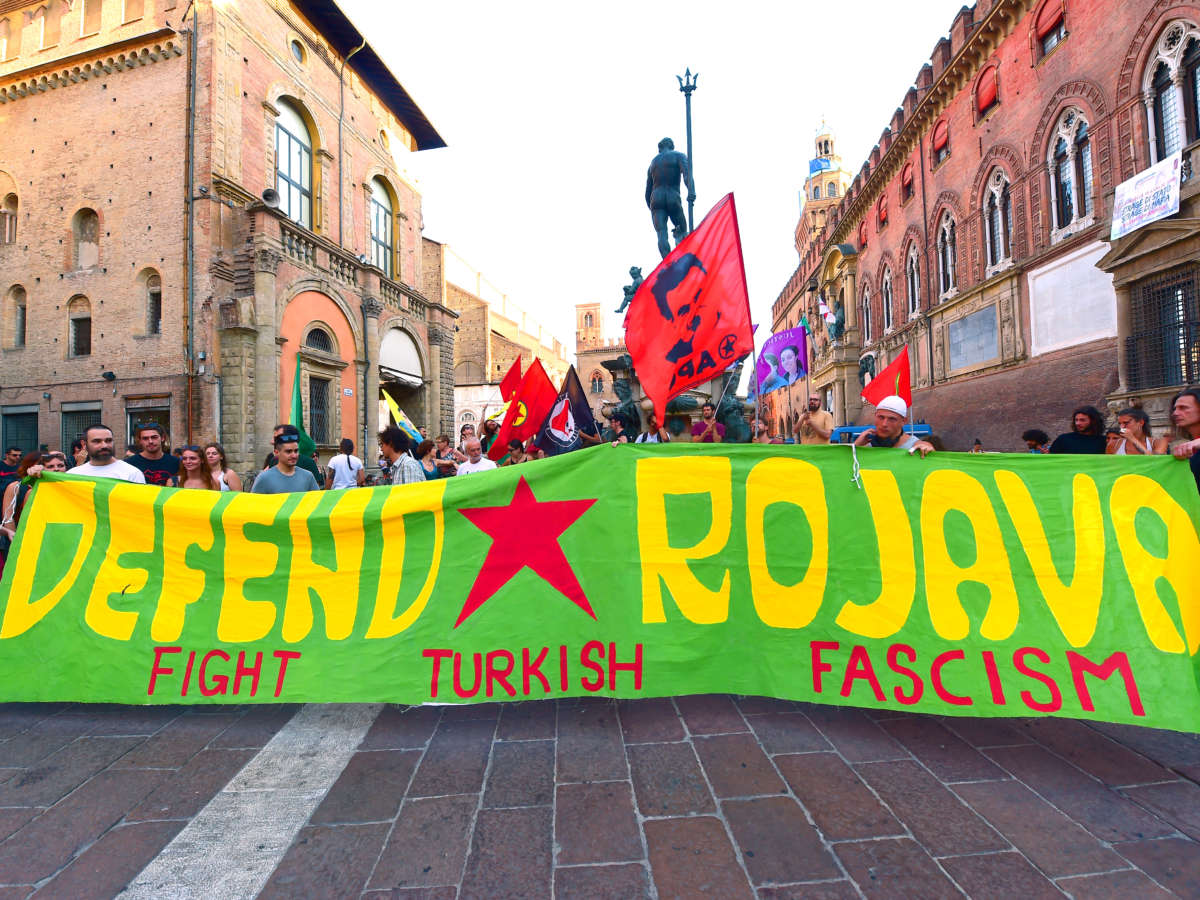President Recep Tayyip Erdoğan appears poised to launch a renewed invasion by Turkish forces of democratic autonomous zones in North and East Syria. Erdoğan’s repeated threats of military action raise fears of a resurgence of ISIS and pose an existential threat to the decade-old experiment in eco-feminist, multi-cultural democracy known as the Rojava revolution.
This week, Erdoğan demanded that the United States withdraw its few remaining troops from North and East Syria, where they act like a small protectorate for the Autonomous Administration of North and East Syria, one of the political structures that governs the Rojava region through a system of “ democratic confederalism.” This decentralized system is built on empowering local communities and representative councils that include dozens of political parties and emphasizes the leadership of women.
The Syrian Democratic Forces (SDF) is a multi-ethnic coalition of militias that provides security for the autonomous region and is backed by the U.S. in a successful campaign against ISIS. Erdoğan considers leftist Kurdish formations within the SDF to be terrorists linked to Kurdish guerrillas who have fought Turkey on its border with Iraqi Kurdistan for decades.
However, supporters say the SDF and the broader Rojava project are building a vibrant, democratic alternative to nation-states as authoritarianism rises in the Middle East and across the world.
More than two dozen activists and academics around the world, including Noam Chomsky, Gail Bradbrook (co-founder of Extinction Rebellion) and former Amnesty International Secretary General Kumi Naidoo, signed a statement of solidarity marking the 10-year anniversary of people of Rojava declaring autonomy during the chaos of the Syrian Civil War. The signatories warned that Erdoğan clearly intends to crush the democratic, women-led Rojava revolution in a bid to drum up nationalist sentiments ahead of a presidential election next year.
“The people of Rojava pose a core threat to any existing government, especially those with imperialist ambitions, by showing the world a viable model of peaceful multi-ethnic coexistence, grounded in lived political, cultural and ecological autonomy,” the activists stated.
Just this week, the U.S. and the Iraq government joined the Syrian Democratic Council, the SDF’s political wing, in condemning Turkey for a bombing in the Kurdistan region of Iraq that killed at least nine tourists from southern Iraq and injured more than 20 other civilians. Turkey attempted to blame leftist Kurdish guerrillas it was targeting for the attack, but the Iraqi government said it has confirmed that the strike came from the Turkish side, according to reports.
“The neighboring Turkish state dropped bombs on civilians amidst its already ongoing attacks against civilian settlements and disrespect for the sovereignty of neighboring countries, targeting the security and stability of the region, especially in Syria and Iraq,” the Syrian Democratic Council said in a statement.
Turkey has already invaded Rojava at least twice in recent years, including a deadly incursion in 2019 that was essentially greenlit by former President Donald Trump, who agreed to briefly remove U.S. forces from the region. Turkey and allied militias were accused of war crimes and forcibly relocating ethnic minorities during the assault. Erdoğan hopes to occupy a buffer zone between Rojava and the Turkish border and relocate Syrian refugees living in Turkey there, raising fears of forced relocations, ethnic cleansing and “demographic re-engineering.”
Turkey and its brutal proxy militias currently occupy two main swaths of North and East Syria, including the embattled towns of Afrin, Ras al-Ain and Tel Abyad. The humanitarian situation in the occupied areas is grim, and kidnappings, illegal arrests, forced evictions, land seizures and deadly infighting between Turkish-backed militias have been documented by journalists and human rights groups. Turkish drone attacks on Rojava, including a strike that killed two SDF members driving in a car this week, have terrorized local populations for months.
Erdoğan is now preparing to expand the occupation in an effort to “clean up” the area and rid it of “terrorists,” according to the president and his increasingly authoritarian and nationalist regime. These so-called terrorists happen to be the same pro-democracy forces that have allied with the U.S. for years in the fight against ISIS. Iran, an ally of the Syrian government of Bashar al-Assad that survived the civil war, has warned against a renewed invasion.
The fledgling, non-state democracy in Rojava is not perfect, and a union of independent civil society groups is built into the structure to bring critiques and complaints to representatives in the autonomous administration. Supporters say this Kurdish-led democratic experiment, built on neighborhood councils and communes in a region where tight-knit communities of various ethnic backgrounds have co-existed for centuries, has managed to survive and build for a decade despite adversaries on all sides.
“[Rojava’s] 10th anniversary may have seemed unlikely when the community first formed and their continued existence is testimony to the outstanding resilience and commitment of the people of Rojava, who willingly accept the consequences of their actions,” the international activists said in their solidarity statement. “From their inception, they needed to defend the revolution against significant hostility: Turkey to the north, Islamic State and the Assad regime to the south and Iraqi Kurdish neighbors to the east.”
The SDF warns that ISIS could make a comeback if manpower and resources are shifted from containing the militants to defending Rojava from Turkey. With few resources and international aid, SDF troops guard dismal prison camps that hold the ISIS militants and their families who were abandoned in Syria by their homes countries. ISIS prisoners have made violent attempts at escape, and Rojava is on constant watch for ISIS “sleeper cells” that have claimed dozens of lives.
“We cannot fight on two fronts,” SDF leader Mazloum Abdi told Reuters this week.


